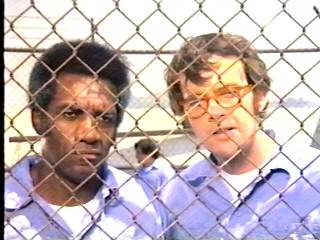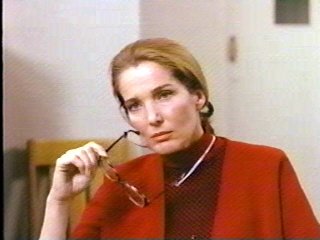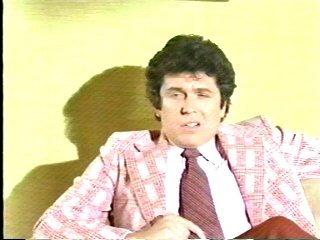
|
|
|
|
|
|
|
|
|
|
|
|
|
(1975) Director: Raymond
Danton
In my opinion, one of the biggest jerks in Hollywood right now is that walking corpse Jack Valenti. If you don't know him, he is the head of the Motion Picture Association of America, which is the agency that rates movies from G to NC-17. Valenti has remained jackass-stubborn about his beliefs that the rating system works, despite the constant complaints that movies are often given too harsh of a rating, especially from independent filmmakers who (unlike the major studios) don't foot the MPAA's bills. As well as the fact that there is no "adults only" category that separates pornographic from non-pornographic adult films, resulting in many filmmakers having to make sacrifices to their visions in order to get an R rating. Sometimes I gleefully imagine what kind of revenge I would inflict on Valenti if I was a studio head and he was giving me problems with rating one of my movies. If I was head of Warner Brothers, I could always in return threaten to re-release (to the MPAA's embarrassment) the G-rated John Wayne war film The Green Berets, chock full of machine-gunned and burning corpses. Or if I was with 20th Century-Fox, I would threaten to re-release the G-rated Planet Of The Apes as a tool for MPAA humiliation, with it being filled with stuff like blood, killings, swearing, and Charlton Heston's naked ass. Even if I was head of an independent studio, I could
easily get the re-release rights to many older movies if the MPAA was
bothering me(*). If Of course, the material in those three scenes still does make a PG rating in this day and age somewhat questionable, so the movie has some value as a historical document, revealing that there were many instances where horror movies were considered more or less mainstream. It wasn't by far the only horror movie of the era to get rated PG. But the fact that Psychic Killer got a PG rating isn't the only thing interesting about it. Though illogically plotted at times, with some unbelievable actions by the characters that are not only dumb but seem a desperate device by the screenwriters (one of them being Greydon Clark, the guy who gave us Black Shampoo and Skinheads) to advance the story, it still manages to be fairly entertaining. It's silly, but it seems to realize this, because some of the laughs are not unintentional. It's briskly paced, seldom boring, and while the turns in its plot are contrived, it does present some things in a different way than usual. One such example is the opening of the movie, which refuses to immediately let us know who is who and how things got up to this point where the movie begins. This first scene introduces us to who will be the central character, Arnold Masters (Hutton, father of Oscar winner Timothy), who is presently confined in a mental asylum for some unknown reason. Even when he's subsequently transferred by the staff to another wing of the asylum over the objection of his physician, Dr. Laura Scott (Murder, She Wrote's Julie Adams), we don't learn anything. It's not until Arnold meets and befriends a new patient in the wing, the mysterious Emilio (V: The Final Battle's Stack Pierce), that we learn Arnold was wrongly convicted of a crime and railroaded into the asylum. Making matters worse, his beloved mother died due to improper care earlier in his incarceration. Emilio doesn't just end up giving Arnold a sympathetic ear to listen to; shortly before new evidence comes up that frees Arnold, Emilio gives him the knowledge of telekinesis. Now free from prison, what better way for Arnold to use this power than to get revenge on everyone that screwed him and his mother over, from the psychologist who testified against him in court right to the neighborhood butcher that was rude to his mother? As you might suspect, it isn't too long after Arnold
starts successfully checking off his Near the end of the movie, Morgan comes up with a plan both clever and surprisingly legal that just might solve the situation (reminded me of a twist I once read in an old EC comic), but this sudden burst of intelligence to his character does little to make us forgot the fact that it's unbelievable Morgan could have continued up to this point. But Masters isn't the only character in the movie to make such unbelievable decisions for their position. Midway through the movie, Dr. Scott seems to forget her occupation requires her to keep information about her patients strictly confidential. But she not only gives the lieutenant information about Arnold, she somehow finds time in her schedule to spend every subsequent waking (and sleeping) moment at Morgan's side. Actually, Dr. Scott really doesn't end up giving Morgan much that is useful. In fact, she only seems to be in the movie not just for the required falling-in-love subplot Hollywood producers frequent insist imposing on a movie, but so the movie is able to have a scene that hints of possible sexual violence, in a scene when Arnold uses his psychic powers to profess his love to Dr. Scott - a proclamation that not only comes way out of left field, but is never brought up again in the rest of the movie. It's a stupid move by Arnold, equally stupid to cryptic statements he makes to Morgan, like telling Morgan to check the butcher shop after psychically dealing with the butcher. Arnold's statements would never leave weight in court - but as you know, try telling someone like Morgan that. All these implausible acts by the characters are what I
was talking about earlier, desperate ways by the screenwriters to
advance the story from one point to the next. True, the plot premise -
a killer using psychic powers to The way Psychic Killer decides to advance, using those character weaknesses, hurt the movie substantially, but fortunately there is still enough to be found to make it an entertaining experience. Strangely, the writing of the characters also provides some of the pleasure. There are a few example of surprising sensitivity to the characters. Refreshingly, the asylum staff, not just Dr. Scott, are not the ogres you might think; one of them, an orderly, actually shows genuine concern and humanity towards Arnold on more than one occasion. And while Arnold may be a ruthless killer, one cannot help but have some sympathy towards him. He clearly is an unstable man; even before he gets psychic powers we see him having an uncontrollable screaming fit. But once he calms down he becomes quiet, polite, and fairly intelligent in his thinking. He kills, but after we learn how thoroughly he's been screwed by the system and how much he misses his mother, you can't help but root him on. It also helps that each of his victims is shown to be so obnoxious that seeing them die before our eyes brings us even more pleasure. The murder scenes aren't just enjoyable for the fact we
get to see creeps getting their just desserts, but that just before
each individual dies, we are often treated to Each victim, each situation, and each method of murder is completely different from the others, and this variety keeps you amused and watching, even with the realization that the movie for the most part is just repeating itself - a murder, cut to the investigation, another murder, back to the investigation, etc. The essentially repetitive nature of the movie is further made palatable by the streamlined direction. There's seldom a moment that feels more like it was put there to help extend the running time rather than entertain the audience or provide an important plot point (the few that there are, of course.) With the exception of those few finger-drumming moments, every scene goes by at a good pace and also does not overextend itself. While there is very little in the style of the direction I can call exceptional, it at least gets the bare essentials down; the look is clean and bright enough, characters and their environment are composed together acceptably, and the low budget for the most part manages to be successfully hidden. All in all, while Psychic Killer may not be up to bigger horror movies I have recommended in the past, it's a nice diversion to go down when you want to go off the beaten path a little and are feeling a little playful, just like how the movie is.
Also reviewed at: Cold Fusion Video * Or, if I felt I could get away with it, I could always submit an R-rated cut of the movie the MPAA was giving me a problem with, and subsequently secretly reinsert the cut footage into the movie just before its release - a technique some filmmakers have done in the past and managed to get away with. Check for availability on Amazon (DVD) See also: Hell's Gate, Psychopath, The Sender |
 I had Psychic
Killer on my hands, I could always re-release this PG-rated
movie with a blurb like, "SEE! A naked woman getting scalded by hot
water and get all cut up after breaking through a glass shower door!"
Not only that, I could also add, "SEE! A guy getting his hand caught
in a meat grinder and the cut-up bloody flesh pouring out!" To top
it all off, I could also insert on the poster, "SEE! A suicidal guy
jump off a high building and his corpse subsequently bleeding from a
head wound on the concrete ground!" I can see the MPAA having a
heart attack by even just imagining the protests they would get from
the parents of youthful ticket buyers who'd see this advertising
material, outraged that a low-rated movie like this could get away with
such material in this day and age. Actually, while those three
descriptions make Psychic Killer sound explicit, the
truth is that the remainder of the movie surrounding these three scenes
is actually quite tame. So tame that even keeping those three bloody
sequences in mind, Leonard Maltin's statements claiming that the movie
is both "violent" and "ugly" seem out of line, even by today's
standards.
I had Psychic
Killer on my hands, I could always re-release this PG-rated
movie with a blurb like, "SEE! A naked woman getting scalded by hot
water and get all cut up after breaking through a glass shower door!"
Not only that, I could also add, "SEE! A guy getting his hand caught
in a meat grinder and the cut-up bloody flesh pouring out!" To top
it all off, I could also insert on the poster, "SEE! A suicidal guy
jump off a high building and his corpse subsequently bleeding from a
head wound on the concrete ground!" I can see the MPAA having a
heart attack by even just imagining the protests they would get from
the parents of youthful ticket buyers who'd see this advertising
material, outraged that a low-rated movie like this could get away with
such material in this day and age. Actually, while those three
descriptions make Psychic Killer sound explicit, the
truth is that the remainder of the movie surrounding these three scenes
is actually quite tame. So tame that even keeping those three bloody
sequences in mind, Leonard Maltin's statements claiming that the movie
is both "violent" and "ugly" seem out of line, even by today's
standards. enemies one by one
from his list that the authorities start to suspect something isn't
quite right with all these mysterious deaths on their hands. The
subsequent investigation is lead by Lieutenant Morgan (Burke, Dynasty),
and this character may be the weakest thing to be found in Psychic
Killer. None of the blame of this character falls on Burke, who
acts out what the screenplay tells him to do in a proper and
professional manner. But as decent as Burke is, not even the best actor
in the world could have made this policeman character believable
concerning the actions he takes in his investigation. It is reasonable
and believable that he might suspect Arnold is somehow involved in the
case after the first few victims, because Arnold did have some
connection with each of them. But the nature of the killings in no way
seem to suggest a connection with Arnold after conducting any kind of
normal investigation. Despite not having any real evidence, physical or
otherwise, Morgan somehow is able to put a 24 hour surveillance on
Arnold. That's incredible by itself, but even more incredible that
Morgan is somehow able to continue this surveillance and investigation
of Arnold after another victim dies at same time the police stakeout is
watching the "sleeping" Arnold.
enemies one by one
from his list that the authorities start to suspect something isn't
quite right with all these mysterious deaths on their hands. The
subsequent investigation is lead by Lieutenant Morgan (Burke, Dynasty),
and this character may be the weakest thing to be found in Psychic
Killer. None of the blame of this character falls on Burke, who
acts out what the screenplay tells him to do in a proper and
professional manner. But as decent as Burke is, not even the best actor
in the world could have made this policeman character believable
concerning the actions he takes in his investigation. It is reasonable
and believable that he might suspect Arnold is somehow involved in the
case after the first few victims, because Arnold did have some
connection with each of them. But the nature of the killings in no way
seem to suggest a connection with Arnold after conducting any kind of
normal investigation. Despite not having any real evidence, physical or
otherwise, Morgan somehow is able to put a 24 hour surveillance on
Arnold. That's incredible by itself, but even more incredible that
Morgan is somehow able to continue this surveillance and investigation
of Arnold after another victim dies at same time the police stakeout is
watching the "sleeping" Arnold.  knock off his
enemies while creating a solid alibi without leaving evidence at the
crime scenes - does initially create a big challenge to the
screenwriters: How do you come to some kind of resolution for this
particular premise that's both plausible enough and does not go the
boring way out by having the killer simply go through his list and
subsequently retire? Since this method of murder is pretty foolproof,
I'll admit that a possible answer to this doesn't immediately come to
my mind. All the same, I remain convinced that after a period of time
thinking it over, just about anyone could come up with a route for this
premise to take that, while maybe not completely plausible,
would almost certainly be more believable than the way the movie
decided to advance to the end.
knock off his
enemies while creating a solid alibi without leaving evidence at the
crime scenes - does initially create a big challenge to the
screenwriters: How do you come to some kind of resolution for this
particular premise that's both plausible enough and does not go the
boring way out by having the killer simply go through his list and
subsequently retire? Since this method of murder is pretty foolproof,
I'll admit that a possible answer to this doesn't immediately come to
my mind. All the same, I remain convinced that after a period of time
thinking it over, just about anyone could come up with a route for this
premise to take that, while maybe not completely plausible,
would almost certainly be more believable than the way the movie
decided to advance to the end.  some form of comedy. Sometimes it
comes from interplay between the victim and someone else, like with one
man trying desperately to seduce a lady friend, or when the butcher
gets into a heated argument with a customer. Some of the other victims
have peculiar personalities, like the naked woman who bursts through
the glass, who moments before her death spent several minutes gettin'
down to boogie her way to her bathroom in a embarrassing display
intended for no one but herself. The funniest sequence comes from
screenwriter Greydon Clark himself, who appears in the role of the
policeman who originally arrested Arnold. Dressed in bright red pants
and a pink plaid coat, he's hilarious simply to look at. Then when he
subsequently finds himself in trouble due to Arnold's psychic powers,
his (intentional?) overacting of his character's panic - as well as the
fact his panicking goes on for more than a few seconds before death
finally shuts him up - well, I'll just say that the movie alone is
worth watching almost for that sequence alone.
some form of comedy. Sometimes it
comes from interplay between the victim and someone else, like with one
man trying desperately to seduce a lady friend, or when the butcher
gets into a heated argument with a customer. Some of the other victims
have peculiar personalities, like the naked woman who bursts through
the glass, who moments before her death spent several minutes gettin'
down to boogie her way to her bathroom in a embarrassing display
intended for no one but herself. The funniest sequence comes from
screenwriter Greydon Clark himself, who appears in the role of the
policeman who originally arrested Arnold. Dressed in bright red pants
and a pink plaid coat, he's hilarious simply to look at. Then when he
subsequently finds himself in trouble due to Arnold's psychic powers,
his (intentional?) overacting of his character's panic - as well as the
fact his panicking goes on for more than a few seconds before death
finally shuts him up - well, I'll just say that the movie alone is
worth watching almost for that sequence alone.